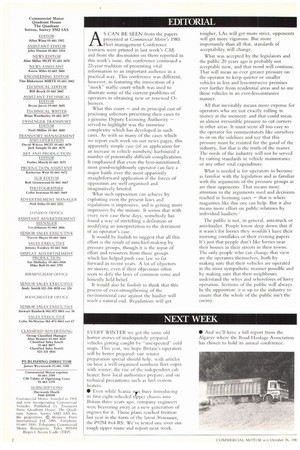EDITORIAL
Page 4

If you've noticed an error in this article please click here to report it so we can fix it.
AS CAN BE SEEN from the papers presented at Commercial Motor's 1985 Fleet management Conference (extracts were printed in last week's CM) and from the discussions on them reported in this week's issue, the conference continued a 22-year tradition of presenting vital Information to an important audience in a practical way. This conference was different, however, in featuring the innovation of a "mock" traffic court which was used to illustrate some of the current problems of operators in obtaining new or renewed 0licences. • What this court — and its principal cast of practising solicitors presenting their Cases to a genuine Deputy Licensing Authority — served to highlight was the immense complexity which has developed in such cases. As with so many of the cases which we report each week on our news pages, this apparently simple case (of an application for an increase in vehicle numbers) harboured a number of potentially difficult complications. It emphasised that even the hest-intentioned, most good-neighbourly operator can face a major battle over the most apparently straightforward application if the forces of opposition are well organised and imaginatively briefed.
What such opposition can achieve by exploiting even the present laws and regulations is impressive, and is getting more impressive by the minute. It seems that with every new case these days, somebody has found a way of stretching a definition or modifying an interpretation to the detriment of an operator's case.
It would be foolish to suggest that all this effort is the result of mischief-making by pressure groups, though it is the input of effort and resources from those groups which has helped push case law so far forward in recent years. A lot of objectors are sincere, even if their objections often seem to defy the laws of common sense and honestly held belief.
It would also be foolish to think that this process of ever-strengthening of the environmental case against the haulier will reach a natural end. Regulations will get tougher, LAs will get more strict, opponents will get more vigorous. But more importantly than all that, standards of acceptability will change.
What was accepted by the legislators and the public 20 years ago is probably not acceptable now, and that trend will continue. That will mean an ever greater pressure on the operator to keep quieter or smaller vehicles in less and less-intrusive premises ever further from residential areas and to use those vehicles in an ever-less-intrusive manner.
All that inevitably means more expense for operators who are not exactly rolling in money at the moment: and that could mean an almost irresistible pressure to cut corners in other areas. It must seem all too easy to the operator for commentators like ourselves to sit on the sidelines and say that this pressure must be resisted for the good of the industry, but that is the truth of the matter. The needs of the industry will not be served by cutting standards in vehicle maintenance or any other vital expenditure.
What is needed is for operators to become as familiar with the legislation and as familiar with the arguments of the pressure groups as are their opponents. That means more attention to the arguments used and decisions reached in licensing cases — that is where magazines like this one can help. But it also means more effort on public relations by individual hauliers.'
The public is not, in general, anti-truck or anti-haulier. People know deep down that if it wasn't for lorries they wouldn't have their morning cornflakes or their evening papers. It's just that people don't like lorries near their houses in their streets in their towns. The only people who can change that view are the operators themselves, both by making sure that their vehicles are operated in the most sympathetic manner possible and by making sure that their neighbours understand the whys and wherefores of lorry operation. Sections of the public will always be the opposition: it is up to the industry to ensure that the whole of the public isn't the enemy.








































































































